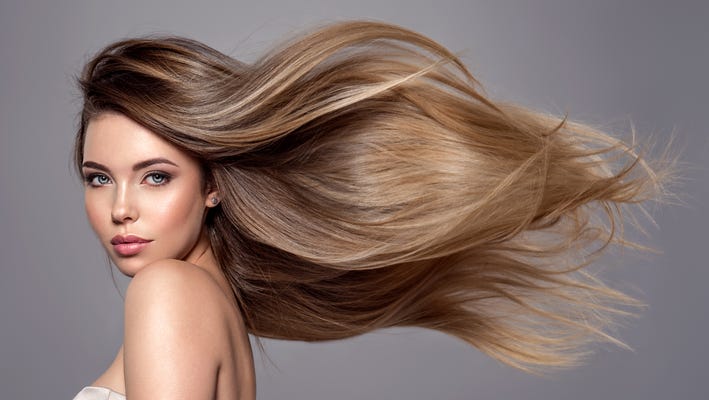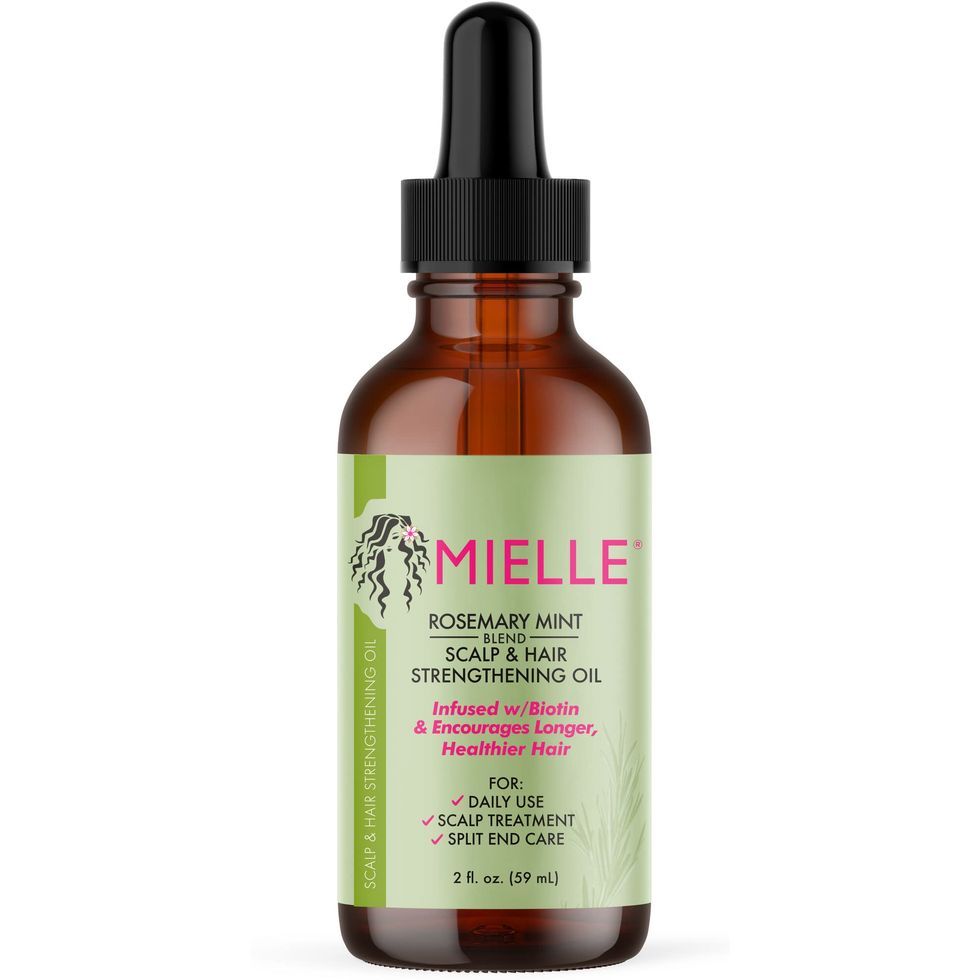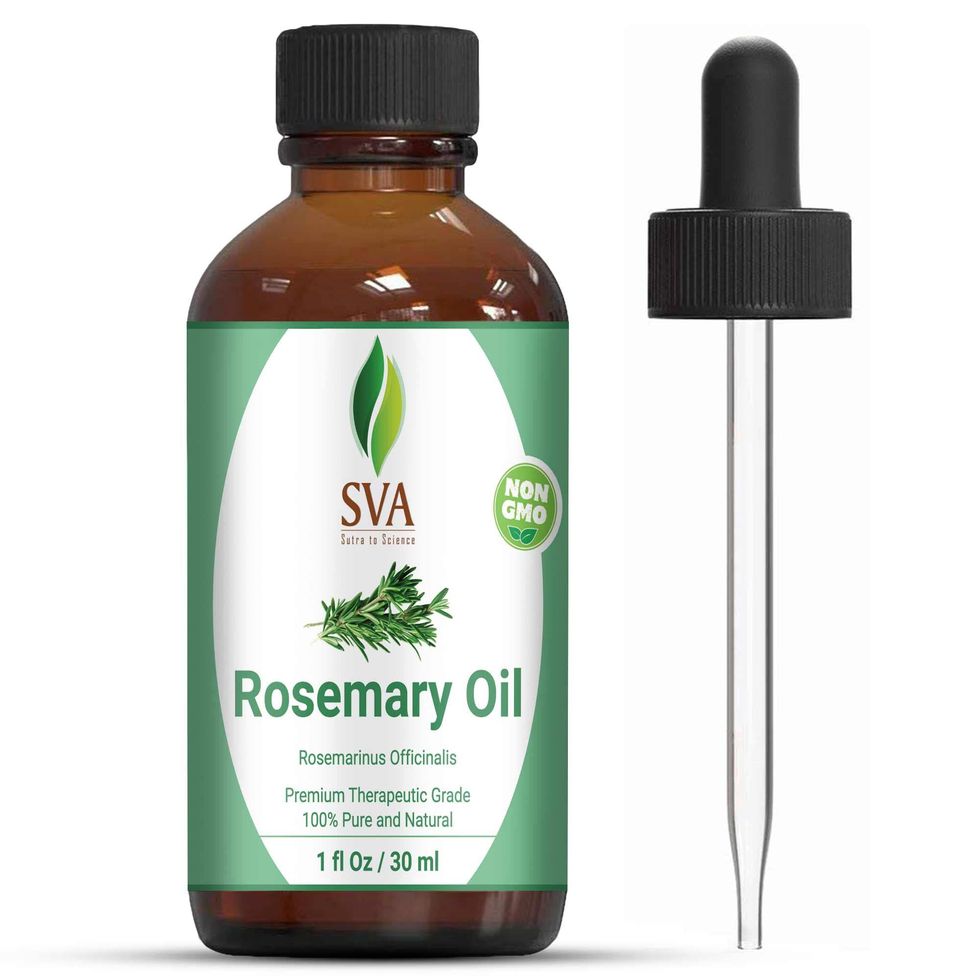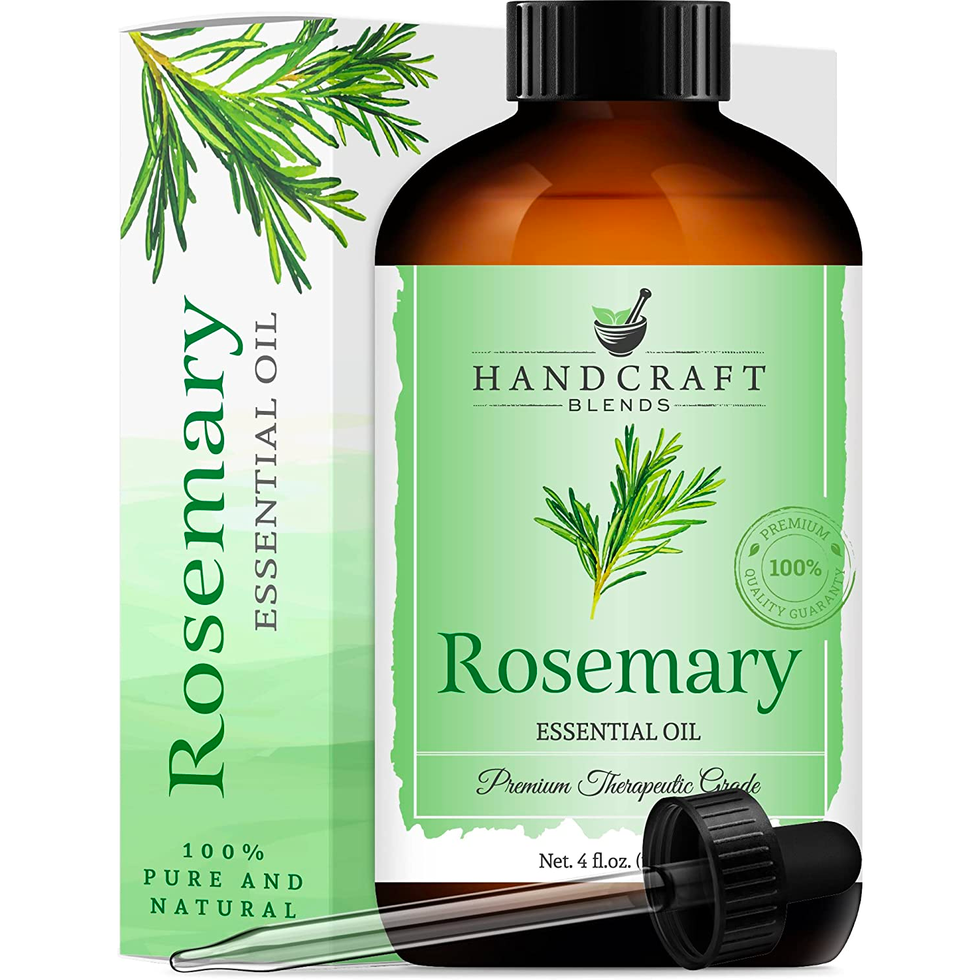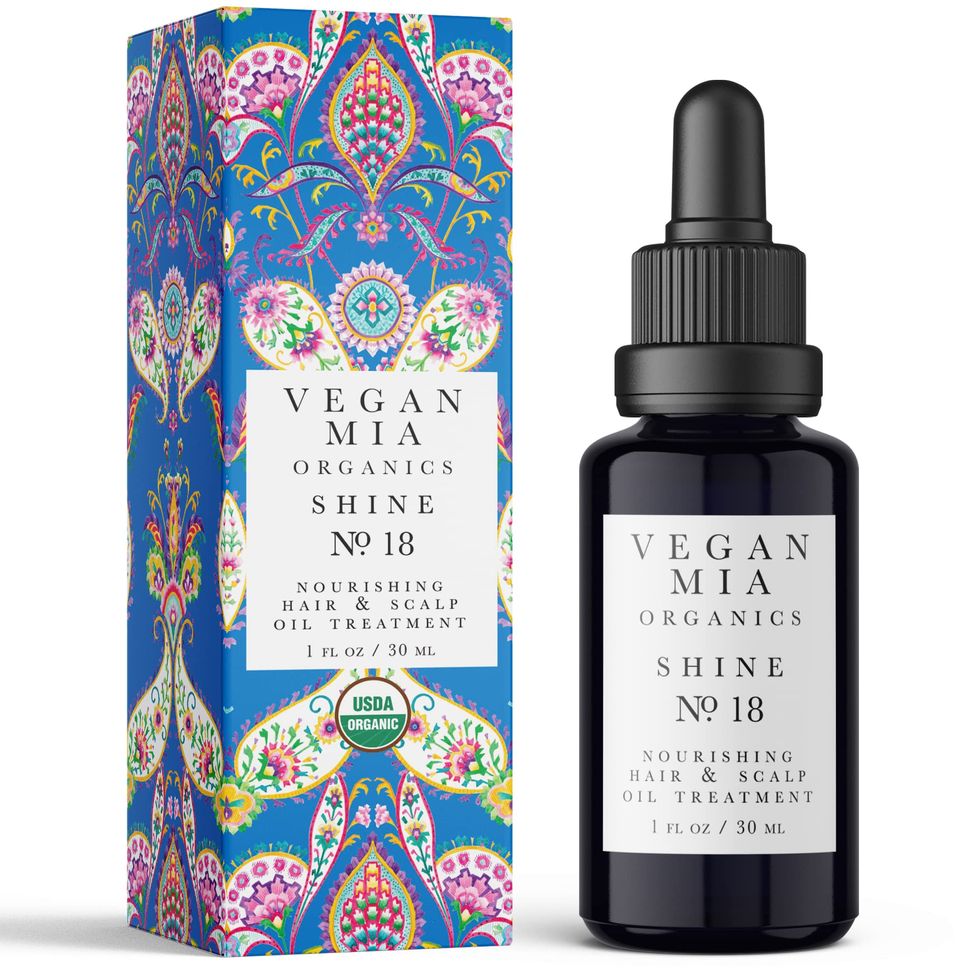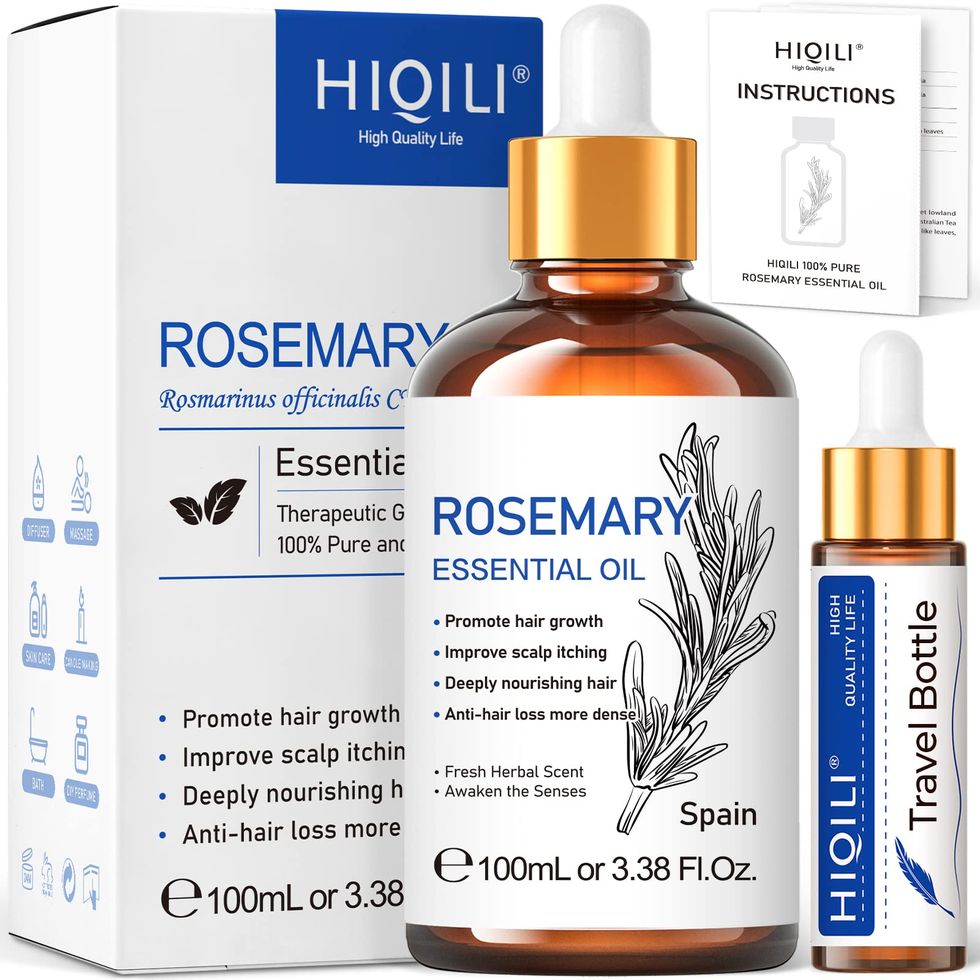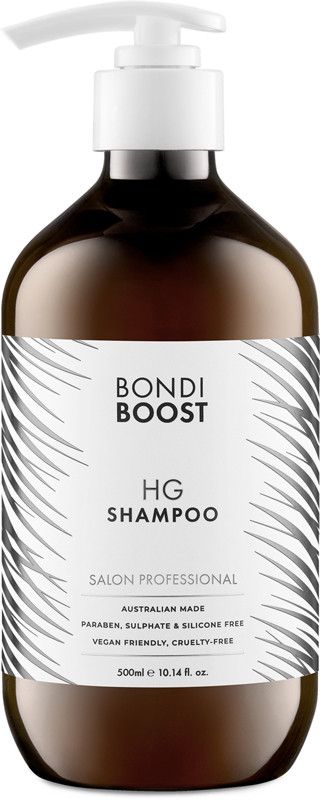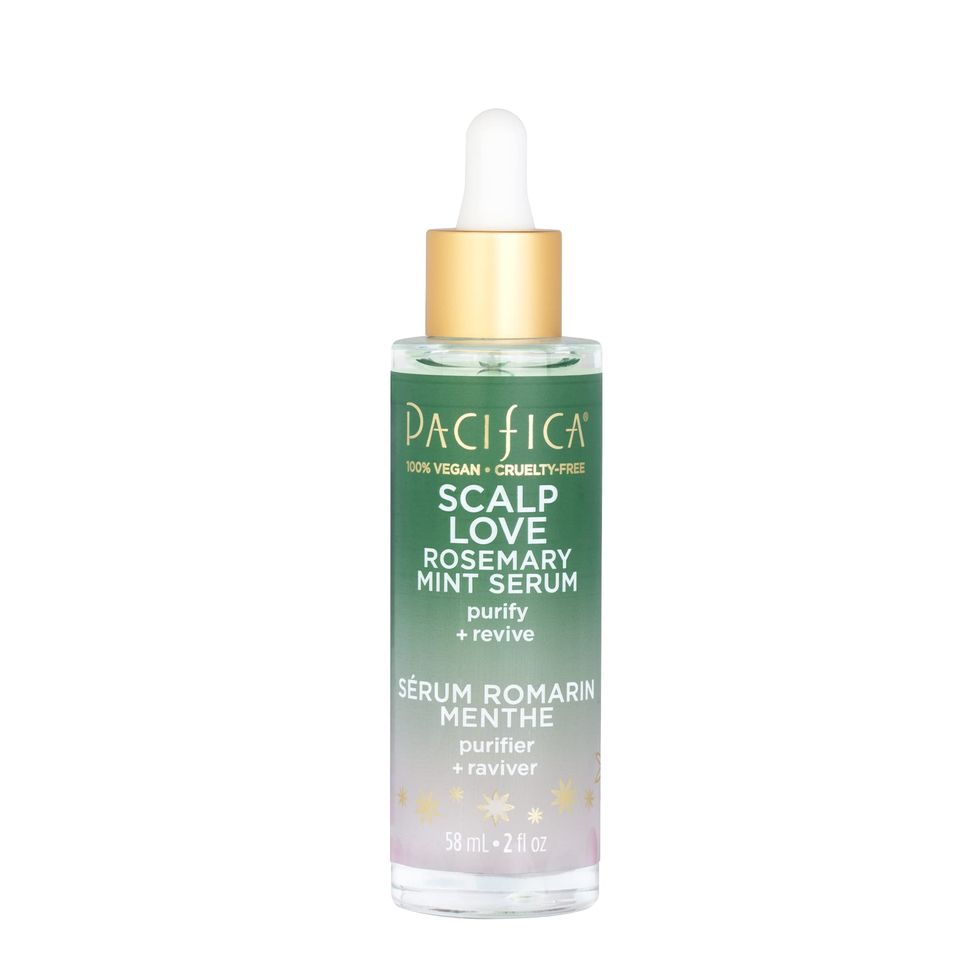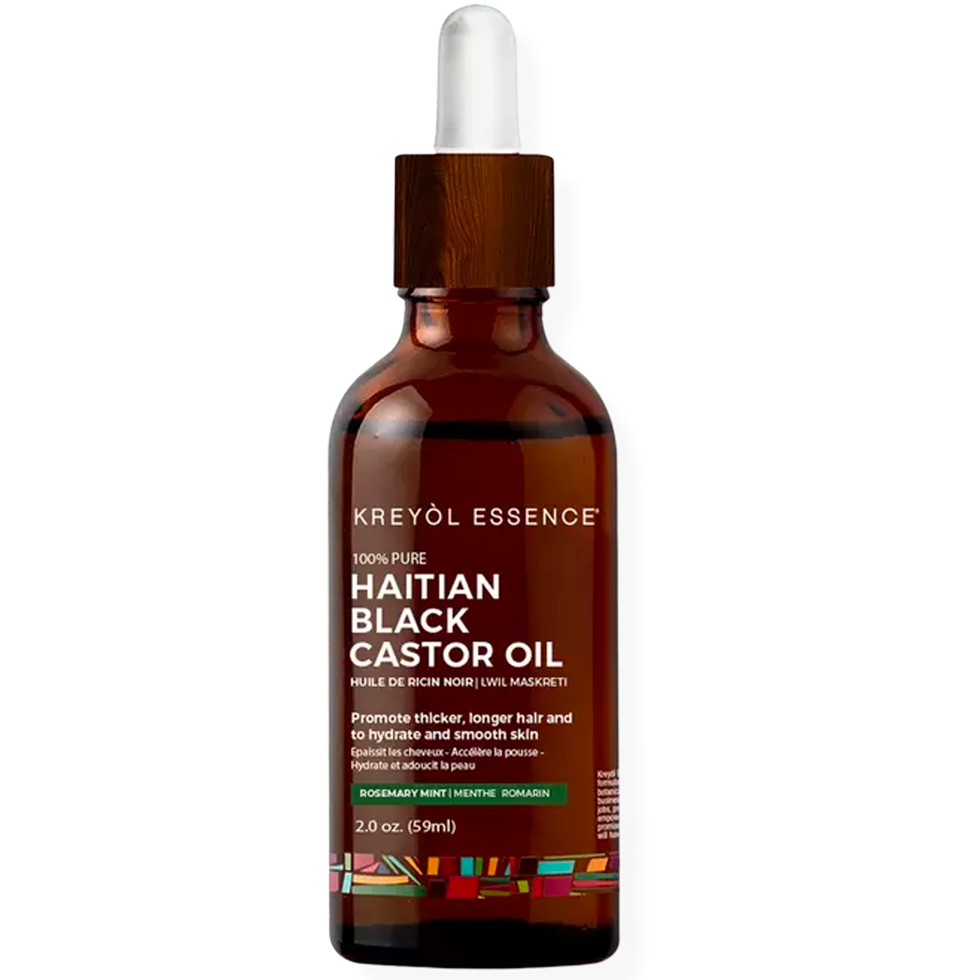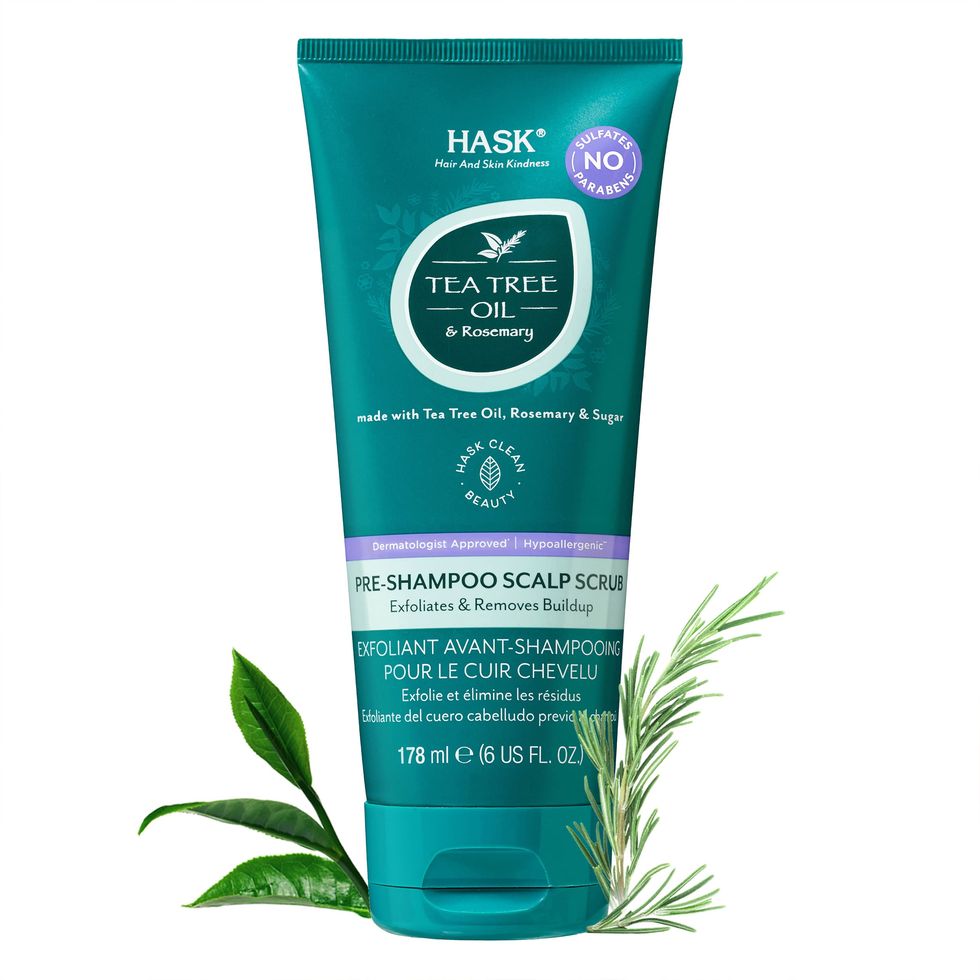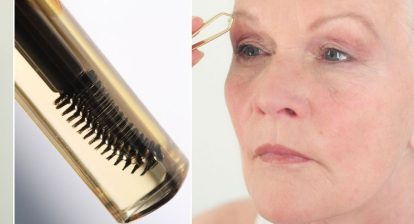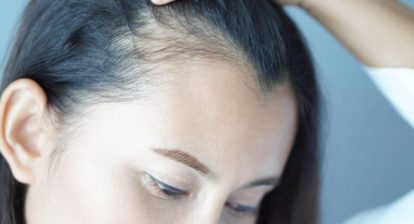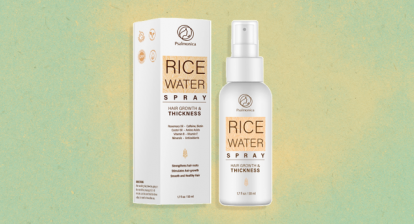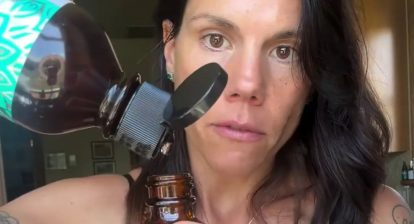I’m no stranger to a little DIY action in attempt to make my hair grow faster (you can’t blame a girl for wanting mermaid-Barbie-esque hair à la Dua Lipa, mmk?). I’ve tried all the viral hacks—including rice-water treatments, aloe vera scalp massages, and castor-oil products—with the latest being rosemary oil for hair growth. According to dermatologists and trichologists, rosemary oil shows some promise for keeping your hair and scalp healthy, and may even be able to help your hair grow a lil bit. Keep reading for all the info—like if rosemary oil is safe for hair, how it works, and how to use it for hair growth—straight—from the experts:
What is rosemary oil?
Rosemary oil is extracted from the leaves of the rosemary plant, which is native to the Mediterranean area. It’s the same fragrant rosemary you season your veggies and garnish your cocktails with and is often considered an aromatic herb, like basil, lavender, and sage. Its fragrance is why it’s often used in perfume formulations, while its potential to help minimize inflammation is why it’s often found in skincare and haircare products.
When shopping for rosemary oil hair products, you’ll likely see “rosemary oil,” “rosemary essential oil,” or “rosemary extract” on the label or ingredients list. These terms are often used interchangeably, says cosmetic chemist Krupa Koestline, even though they’re all a bit different. In general, rosemary extract is the most potent form of the ingredient, where rosemary essential oil is a bit less potent because of the extraction process. And, typically, rosemary oil refers to rosemary essential oil that’s been mixed with a carrier oil (like sweet almond oil or jojoba oil) to dilute it a bit more.
Is rosemary oil good for hair growth?
Rosemary oil, rosemary essential oil, and/or rosemary extract is potentially good for hair growth, depending on who you ask and how seriously you take its limited evidence. One 2013 study conducted on mice showed that rosemary leaf extract was effective in helping to promote re-growth in hormone-related hair loss (often referred to as male-pattern or female-pattern baldness).
Dermatologist Yoram Harth, MD, also pointed to a commonly cited 2015 study that compared rosemary oil to 2 percent minoxidil (the active ingredient in Rogaine) when used on men with genetic androgen-related hair loss for six months. In this study, there were very little differences in the amount of hair growth between both groups. However, it’s important to note that many dermatologists recommend 5 percent minoxidil for hair loss, not 2 percent. However, if you find minoxidil irritating on your scalp, you might wanna try rosemary oil, which caused significantly less scalp itching in the study.
Benefits of rosemary oil for hair growth:
Rosemary oil has a lot of benefits that could potentially lead to hair growth down the line, even if it isn’t a proven method for growth. Carnosic acid, one of the main ingredients in rosemary oil, is thought to potentially stimulate and heal nerve tissue, according to one 2010 study, which could possibly do the same to your scalp and help encourage hair growth. Dr. Harth explains that the other main ingredients of rosemary oil—α-Pinene, 1,8-cineole, camphor, and borneol—may all be beneficial for hair growth too, and points to “a 2017 study that noted these natural compounds might have anti-inflammatory, antifungal, antibacterial, antioxidant, and pain-reducing properties,” Dr. Harth says.
Rosemary oil is also thought to potentially boost blood flow to hair follicles, thus encouraging healthier hair growth, and can also minimize cell-damaging free radicals with its strong antioxidant properties. Plus, it’s anti-inflammatory, which is great for anyone who’s experiencing inflammation-based hair loss or thinning from stress and/or hormone fluctuations.
What are the side effects of rosemary oil for hair?
There are very few negative side effects of using rosemary oil on your hair and scalp, as it’s well tolerated by most skin and hair types. However, if you are pregnant or breastfeeding, talk to your doctor before adding it to your hair routine (camphor, which is found in rosemary oil, has some potential risks with pregnancy and hasn’t been widely studied).
Keep in mind, though, that there are always risks of contact dermatitis and irritation with any new topical ingredient you try, especially when they involve botanical extracts. So test the oil on the back of your neck first and wait two to three days to see if you have any negative reactions before massaging it all over your scalp.
Can you use rosemary oil for hair loss?
There’s no harm in using rosemary oil for hair loss, as long as you manage your expectations. “Rosemary oil has been compared to minoxidil for its ability to improve circulation on the scalp and even encourage cellular turnover,” says certified trichologist Gretchen Oligee, “which can both improve hair growth and help prevent hair loss,” she says. Plus, rosemary oil has anti-inflammatory qualities that, over time, could potentially help prevent inflammation-based hair-loss conditions, like certain forms of alopecia, Oligee notes.
That being said, hair loss is multifaceted and could be caused by age, hormones, genetics, stress levels, your environment, or certain medications. Which means it’s vital to see your doctor if you’re shedding more hair than average (average tends to be 50 to 100 hairs per day, FYI), as hair growth often requires a varied and robust approach.
How do I use rosemary oil for hair growth?
There are a few ways to use rosemary oil for hair growth, depending on the formula you’re using and the level of effort you’re willing to put in. If you’re using rosemary oil that’s already mixed with a carrier (like castor oil), you can drip two to three drops directly onto your scalp, then massage in. (FWIW, I like to use a silicone scalp massager to really ~get in there~, but feel free to just use your fingertips.) But if you’re using pure rosemary essential oil, you’ll need to dilute it first with either another oil or your shampoo.
But I’ll be honest: DIYing rosemary for hair growth can be tricky (Dr. Harth warns against using too much, which could possibly irritate sensitive skin), so it’s recommended you use a product that’s already formulated with rosemary oil and follow the manufacturer’s instructions, whether it’s a rosemary-oil shampoo, a rosemary-oil treatment, or a rosemary-oil deep conditioner.
How long does rosemary oil take to grow hair?
It took six months for testers to notice hair growth in the 2015 study that compared daily rosemary oil scalp treatments to minoxidil. That said, it’s not guaranteed you’ll see any hair-growth results from rosemary oil, let alone in a specific time span. So if you don’t feel like waiting six months to see potential results, or you’re becoming increasingly worried about your hair loss, make an appointment with your dermatologist who can recommend faster, more effective treatments, like prescription minoxidil, custom-compounded formulas, injections, microneedling, light therapy, and/or oral medications.
Who should not use rosemary oil for hair?
Although rosemary oil can be used on all hair types, it can potentially be a bit heavy on fine, thin, or low-porosity hair (i.e. hair that doesn’t absorb ingredients well and products tend to just sit on top). In that case, you might experience oily roots or greasy ends with rosemary oil—and tbh, any hair oil.
Do you have to dilute rosemary oil for hair?
You don’t have to dilute rosemary hair for your hair if it’s already mixed with another oil (usually castor oil or jojoba oil). But, if you’re using a pure rosemary essential oil, yes, you should dilute it with a carrier oil, such as grapeseed oil or coconut oil, or in another product, like shampoo, instead of applying it directly to your hair or scalp. Why? Because essential oils are so concentrated, they can easily irritate your skin, leading to flaking, burning, and dryness.
Can I apply rosemary oil directly to hair?
Rosemary oil can be applied directly to your hair strands (it won’t cause damage), but it should be massaged into your scalp if you’re looking for the potential hair-growth benefits. Just note that if you have fine hair, you’ll probably prefer to massage the oil in before bed, tie your hair up while you sleep, then rinse the next morning with a clarifying shampoo to get rid of any greasy residue. Or, if you want to use it during the day, massage it on and pull your hair back into a sleek bun with a boar-bristle brush and a couple hair elastics to make the ~grease~ look purposeful.
If you’re working with type-4 hair or ultra-thick/dry/coarse hair that never gets greasy, you have more flexibility in how you apply your rosemary oil. You can use it twice a day by massaging it into your scalp in the morning and then again at night, or just once a day if you have a sensitive scalp (and/or zero time).
Is it safe to use rosemary oil on hair every day?
For most people, it’s safe to use rosemary oil on your hair and scalp every day, says Dr. Harth, provided you patch-test first to confirm you don’t have any sensitivities. Oligee even recommends applying rosemary oil twice a day if you have high-porosity hair that soaks up oils and butters like a sponge, and if your scalp isn’t overly sensitive.
Keep in mind, though, that essential oils, even when mixed with a carrier oil, can be potentially irritating, so you might want to take it slowly at first (like two to three times a week). Plus, if you’re acne-prone or have an oily scalp, you’ll probably prefer to stick to once every couple of days to avoid potentially clogging your hair follicles, as well as having to wash your hair too frequently.
Is it okay to leave rosemary oil in your hair overnight?
Yes, it’s totally okay to leave rosemary oil on your hair and scalp overnight. However, if you’re prone to buildup or your scalp is naturally oily, you’ll probably prefer to wash it out in the morning and may need a clarifying shampoo to get your hair feeling clean. Don’t wanna deal with the hassle? Just massage your scalp with rosemary oil 10 to 15 minutes before hopping in the shower, then wash it out with your usual shampoo and conditioner routine.
Final thoughts:
Turns out, rosemary oil for hair might be a great option to test out if you’re dealing with hair loss or thinning, as well as dry, itchy scalp. While there are a few studies showing promise for rosemary oil and hair growth, more research needs to be done to definitively call it a proven hair-growth treatment. But as is the case with most hair growth remedies, don’t expect results overnight. As great as a rosemary oil concoction might be for calming inflammation, it’s no magic hair cocktail—but hey, it might be worth a shot.
Meet the experts:
- Krupa Koestline is a clean cosmetic chemist and the founder of KKT Consultants where she consults with brands on clean guidelines, as well as new and eco-friendly manufacturing processes.
- Yoram Harth, MD, is a board-certified dermatologist in San Francisco, CA. He’s also the founder and chief medical officer of MD Hair, a customized subscription hair-growth treatment.
- Gretchen Oligee is a certified trichologist and hairstylist at Foushee Salon and Spa in Littleton, CO. She has expertise in hair loss, hair cutting, and hair color.
Why trust Cosmopolitan?
Beth Gillette is the beauty editor at Cosmopolitan with five years of experience researching, writing, and editing hair stories that range from shea butter for hair to shampoos for oily hair. She’s an authority in all hair categories, but is an expert when it comes to rosemary oil for hair. After interviewing experts and researching up-to-date info on rosemary oil for hair, she tested it for two months on her own short, fine hair.
Brooke Shunatona is a contributing writer for Cosmopolitan with more than 10 years of experience writing about beauty, fashion, and lifestyle articles, including hair trends and the best wigs on Amazon. She interviewed experts and researched rosemary oil for hair to write this story.
Beth Gillette is the beauty editor at Cosmopolitan, where she covers skincare, makeup, hair, nails, and more across digital and print. She can generally be found in bright eyeshadow furiously typing her latest feature or hemming and hawing about a new product you “have to try.” Prior to Cosmopolitan, she wrote and edited beauty content as an Editor at The Everygirl for four years. Follow her on Instagram for makeup selfies and a new hair ‘do every few months.

Brooke Shunatona is a contributing writer for Cosmopolitan.com.


